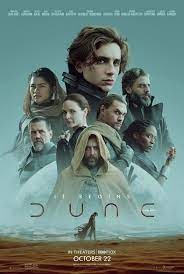Based on the previous films directed by Denis Villeneuve, I was quite excited to see his grand yet sharpened style grapple with an adaptation in his latest film, Dune. Bolstered with a star-studded cast, rich source material, and a mixed reception film in 1984, it’s safe to say that this film was already faced with high expectations to do better. You will immediately notice upon seeing this film that it is subtitled part one, which should suggest that Villeneuve will be taking his time in establishing the vast sci-fi lore that accompanies what some have called Frank Herbert’s unadaptable work. It is unclear if a second film has actually been greenlit but what is clear is that Villeneuve has some confidence in his vision to title it as such. That being said, this definitely feels like a part one as the story is incomplete, there is a lot of set up, and some actors you’d expect to see more of don’t get a chance to shine, which tells us that we will see more of them in the second part, assuming it happens. And this film deserves to be completed because with all of this preface out of the way, I am delighted to say that Dune delivers itself as a competent film in almost every facet and justifies its existence.
I don’t think anyone would disagree that it’s difficult to adapt books to the big screen, especially one with so much world-building and politics that need to be established in order to appreciate this new world and why the events unfolding matter. Additionally, this must be done in a way that feels both engaging and natural to the audience while also introducing our wide array of characters. It’s a tall order, but Villeneuve along with writers Jon Spaihts and Eric Roth pull it off despite the odds and the limited time that a film offers to convey so much information. Our story primarily follows Timothée Chalamet as Paul Atreides, heir to House Atreides led by his father, Duke Leto Atreides (Oscar Isaac), whom at the emperor’s decree, must harvest a rare substance called spice from the planet of Arrakis, home of the Fremen. That brief description of the plot alone is enough to overwhelm some or have them at least asking several follow up questions, and amazingly the writers are able to answer most of them without the pacing taking a massive dip, though it can get pretty drawn out at times. While Villeneuve loves to take his time visually, he is also able to keep the narrative moving at a healthy pace for a two-hour and thirty minute run time so the audience is constantly in awe and rarely bored by the events taking place. That in and of itself is an impressive feat but the film goes even further with some solid characters, music, sets, and costuming.
Now I won’t pretend like all of the characters are incredibly fleshed out or intricate, but for a cast of this size it’s remarkable that we are able to latch onto something with each character. While we may only have a surface level understanding for most of them, the film does a great job of establishing all of these factions and the characters within them; so even if you don’t know a character’s name, everyone you meet is distinct and you understand their relationship to one another and how their role matters narratively. If you’re familiar with Villeneuve’s Blade Runner 2049, then you know he is a great visual storyteller and with the help of cinematographer Greig Fraser, Dune is no exception. Whether it’s CG, on location, or a practical set, the film captures the atmosphere of wherever they’re at with stunning shots that give you a sense of dread, wonder, or intensity. Combine that level of artistry with fantastic costumes that make the world feel realized, ranging from polished uniforms to gritty survival suits, and you’ve really got something tangible to hold onto. Now top all of that off with an epic score from Hans Zimmer that not only matches the gravity that each scene presents but enhances it immensely. I will note, however, that there were a few musical choices that feature some high-pitched screaming that did rub me the wrong way, but overall it was pretty minor.
As far as other gripes with the film go, I of course would have loved more insight on a lot of the characters, but I realize it’s just not possible unless this were a series with much more time to delve into them. Also there were a few instances when some dialogue was very hushed or whispered and was sometimes unintelligible, but the fact that I really wanted to know what they were saying is a good indication that I was immersed in the film. All of the aforementioned elements of Dune really make it an all-around strong piece of cinema that audiences will undoubtedly find some aspect of it to cling onto. The score and scale of this film really gives it its own definitive look and feel that must be seen in theaters, though it is also available on HBO Max. No matter how you choose to view it, I would recommend watching this film to see how the experience holds up for you, but I sincerely hope we get a part two to what could maybe be an awesome trilogy.

